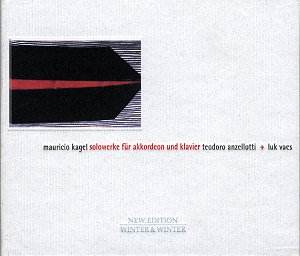Some time ago, I
reviewed another disc with music by Kagel (Æon AECD
0311) which also included some of the pieces from the radiophonic
fantasy Rrrrrrr.... This cycle of forty-one pieces
(all titles begin with the letter ‘R’) includes six pieces for
organ which have been transcribed for piano (two and four hands)
heard in the Æon disc and four of which have been transcribed
for accordion by Anzellotti. This is Kagel at his most humorous
and his most accessible. There is a good deal of wry humour and
irony in these entertaining parodies. Episoden, Figuren
for accordion is a much more serious, ambitious and, - I must
admit - very successful piece, quite idiomatically written for
the instrument and well worth having in Anzellotti’s superb reading.
The present release also includes several piano
pieces of which the quite early Metapièce [Mimetics]
of 1961 still clearly bears the imprint of the musical avant-garde
of the early 1960s. It allows for some considerable freedom in
that the notated material only gives some graphic proportions
to which the player must nevertheless adhere strictly. It may
also be played simultaneously with one or more compositions by
Kagel or any other living composers. (In this case; the title
of the piece becomes Mimetics [Metapièce],
a typical touch of Kagel’s humour.)
MM51 was also included in the Æon
disc. The piece, for piano and metronome (ticking at MM51), subtitled
Ein Stück Filmmusik, is some sort of Schönberg’s
Begleitungsmusik in a nutshell, so to say, ending
with the pianist’s last breath. The various episodes suggesting
clichés of film music are set against the implacable ticking
of the metronome, which at times creates considerable rhythmical
riot. Lightweight stuff, but could be entertaining in its own
way.
Passé composé of
1992/3 is by far the most ambitious and substantial piano piece
by Kagel. The composer describes it as "a piece of musical
reflection on the rhapsodic labyrinth of memory". It certainly
alludes to earlier piano music without really quoting any (at
least, I did not notice any such quotes) and it seems conspicuously
devoid of any theatrical element often found in Kagel’s music.
The only "gimmick" asked for is that at the very end
of the piece, the player switches a small, simple cassette player
playing a soft section of the piece, as in a dream. The composer
insists that sophisticated cassette player should be banned, but
rather calls for some rough, imperfect sound reproduction. Yes,
with Kagel, you never really know where you stand...
The most recent piece A deux mains,
written as a test piece for the Secondo Concorso Pianistico ‘Umberto
Micheli’, is Kagel’s first – and possibly sole – genuine morceau
de concours. It comes as a real surprise, for this is a marvellous
piece of fluid piano writing of great refinement and subtlety,
a real gem indeed.
Impressive and dedicated performances by musicians
who obviously enjoy Kagel’s often whimsical music. Teodoro Anzellotti’s
playing is remarkably free from any vulgar touch that may sometimes
be associated with accordion. His is reall classical accordion
playing of the highest order. The Belgian pianist Luk Vaes has
a long association with Kagel’s music. He actually commissioned
Passé composé which he premiered in
1994. This beautifully produced disc provides for some interesting
insight into Kagel’s protean music making.
Hubert Culot
This beautifully produced disc provides for some
interesting insight into Kagel’s protean music making. … see Full
Review
